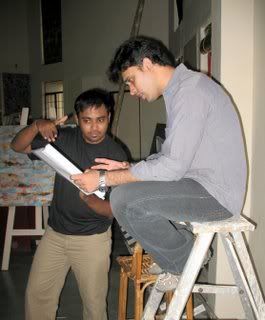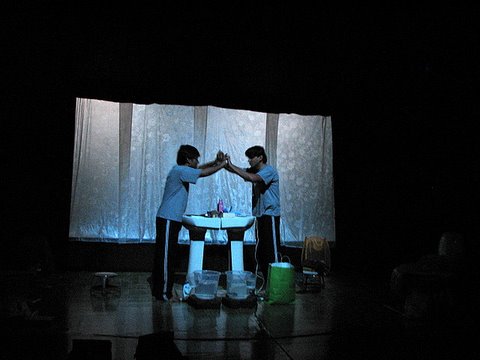A bunch of IT professionals, with a hectic weekday schedule, are keeping themselves busy even during the weekends. They have been smitten by the theatre bug. ‘Rebelz’ as they are otherwise known, formed this group with just one purpose in mind. To provide quality English language plays in Chennai, and also of course to have fun.

Vinodh, one of the core members, just can’t disengage himself from this passion he shares with his bunch.
He writes:
“Come weekends and we’re at our efficient best in rehearsals. Memorizing dialogues, working out the sound ideas, imagining our costumes, and rehearsing our scenes. Pages and pages of lines to memorize in the weekends for the folks who type lines and lines of codes during weekdays. Coffee and colas keep us awake between shots. Playing pranks on each other keeps us all charged up, after all we are in the serious business of making people laugh.”
The countdown for their next production “Once upon a time in Arabia” has begun and they are working overtime for this magical journey to be staged on July 26 and 27, in Chennai, Tamil Nadu. If you happen to be in Chennai, if you’d like to catch the show you can get your tickets at ticketsnew.
Deepa, from Bangalore is calling the recent play she watched, ‘The women in me’, as ‘An intense and absorbing play’. The play is about a man whose wife is dead and he is deeply troubled by that and has lost his emotional balance. Based on the concept – ‘There is a woman in every man and vice versa’. Reviewing the play on Metblogs, Deepa is astounded by the use of Shadow to portray a particular scene and the rapid-fire delivery of dialogue in following sequences.
“The play disturbed me and made me think hard; I am very impressed that such a young man is able to delve so deeply into the male and female psyche and bring out the nuances of how men do not even understand when they are raping their own wives…”
Tanya Behera reviews a play titled ‘Lucknow 76′ organized by Alliance Française de Bangalore, at her blog Remainconnected.
“The plot of the play was based on politics and history, shifting between two time frames of 1876 and 1976 looking at Lucknow city through the eyes of the common man. 1876 was a milestone for the Britishers, as that was the year, when Queen Victoria took over the command from the East India Company. 1976 was also significant in history because during that time, the once proud democracy, India was under the clutches of tin pot dictator, Indira Gandhi who had declared a state of Emergency as the Prime Minister of the nation.”
She goes on to give more information on why the play was named after ‘Lucknow’, not ‘Delhi’, ‘Bombay’ or ‘Calcutta’.
“But then why ‘Lucknow’ and why not ‘Delhi’ or ‘Bombay’ or ‘Calcutta’ or ‘Madras’ or ‘Bangalore'? Because the director and playwright of the play, Abhishek Majumdar (AM) had spent some part of his childhood in this city. During AM's visits to Lucknow, his grand uncle, a scholar of history and geology had inundated his mind with tales and chronicles about the city from an old bungalow.”
Geetali Tare, writing for HimVani under the post ‘The Shimla tragedy: Missing theatre, missing drama’ wants the following for Shimla:
Unlike films, plays are not a passive, one-way, pre-packaged experience. In plays, as in films, there are rehearsals. But once the show gets going, a theatre artiste does not have the opportunity to give another ‘take’ – to make another attempt at mouthing a dialogue: what has been said, has been said. Audience reactions affect acting as it happens. The warmth in the tone of a speaker travels directly to the viewer; a glimmer of a tear in the performer’s eye immediately causes the spectator to respond. A skilled actor, through the blend of voice, tone, gestures and outfits succeeds in creating a world and transporting his audience to it. The actor’s energy expands and fills up the space which is also occupied by the viewer; the energy flows from one to the other. The viewer feels the despair of Mahatma Gandhi at Pyarelal’s delinquency; he feels Zulfi’s longing for Amrita; he laughs with Dhanjisha Batliwala & quibbles with Madhukar Kulkarni.
Kay Kay, Naseruddin Shah, Dinesh Thakur, Aul Kulkarni, Shabana Azmi, Boman Irani, Mehrbanoo Mody Kotwal, Rahul Da Cunha, Feroze Khan, Sanjana Kapoor, Shernaaz Patel, Rajit Kapoor, Jayati Bhatia: they allow you to enter their world and experience, in the span of two hours, many highs and lows, rapture and anguish, a whole world of moods and happenings.
I want this in Shimla. I want this for Shimla.
The Mumbai Theatre Guide is a dedicated site for reviews and different theatre related events happening in the city of Mumbai.







2 comments
Great post! Truly displays the cultural strength of India. I wonder whether these great English language plays are making their way into the English speaking communities in the world.